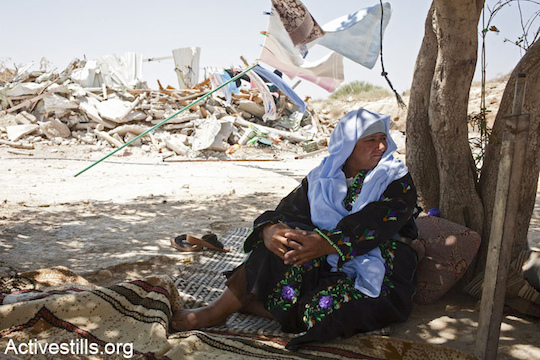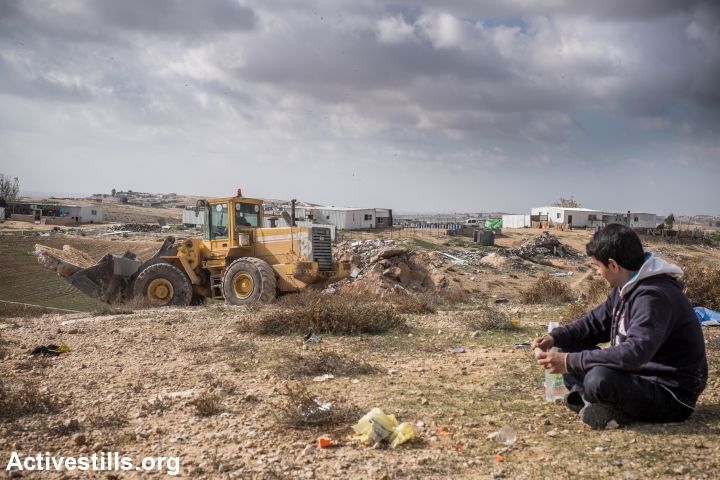While the majority of Jewish Israelis will have no problem voting on election day, some Bedouin will be forced to travel up to 40 kilometers simply to participate in Israel’s democracy.
By Khalil Alamour and Amjad Iraqi

In the run-up to every election day in Israel, polling stations are set up in various locations in every city and town to ensure that residents have easy access to cast their votes. Most towns also have public transportation that takes residents to the stations, or to their original hometowns in other parts of the country where they are registered to vote.
This is not the case for the tens of thousands of Arab Bedouin citizens of Israel living in the unrecognized villages in the Naqab (Negev). On election day, voters from these villages have to travel between 10 to 40 kilometers in order to cast their ballots at their designated polling stations in villages other than their own. While buses operate throughout most towns in Israel – albeit far fewer in Arab towns – public transportation is completely absent from these villages. In fact, the villages do not even appear on Israel’s official maps, despite the fact many of them existed before the state’s establishment.
The burden thus falls on the Bedouin citizens themselves to cover the distance and cost to exercise their right to vote. However, due to high poverty and limited financial resources, many of these villagers do not own or cannot afford cars, and instead have to rely on relatives or friends who have cars to drive them to the polling stations. This requires volunteer drivers to make several trips back and forth in order to take as many people as they can, meaning that the process of taking a few dozen people to the polls amounts to several hours of travel and many shekels in gas at the drivers’ expense. In some villages, various political parties supply transportation as a way of attracting votes, which impedes on the citizens’ right to make their political choices based on independent will rather than favors provided.
This disorganized system of voting is not simply a matter of administrative neglect — it is a direct outcome of the state’s refusal since 1948 to grant legal status to the unrecognized Bedouin communities, in contrast to its support and recognition of Jewish towns in the Negev. This means that the establishment of polling stations in these Bedouin villages – alongside other basic services such as public transportation, safe roads and electricity – are flatly denied. Further, because the villages are legally “invisible,” these Bedouin communities have no official municipalities or regional councils that can finance or facilitate the logistics needed for election day in the state’s absence.
The Bedouin community and human rights organizations have demanded that these issues be addressed for many years, but Israeli authorities have shown little interest in doing so. This year, Adalah wrote to the Central Elections Committee asking it to order the provision of public transportation for the residents of the unrecognized villages to get to their polling stations on election day. The committee, however, responded that it could only give financial support for already-established public transportation, which did not exist in these areas, and therefore could not do anything for the residents.

The committee’s technical excuse ignores, if not deliberately hides, the real matter behind this case. For the state, establishing polling stations or public transportation in the unrecognized Bedouin villages implies that they acknowledge their right to exist and that their residents should be receiving basic services. This would not only contradict the state’s historical policy toward the villages, but also undermine its plans to demolish their homes and forcibly evict the residents in order to build new Jewish towns and state infrastructure over their lands – as is clear today through the proposed Prawer Plan. This is also why in recent years, several polling stations were moved further from unrecognized villages and into government-planned townships, as a means of “encouraging” the villagers to leave their lands and relocate there.
Obstructing the right to political participation for thousands of Bedouin citizens, like many other basic rights, is thus inextricably linked to the state’s wider discriminatory treatment of its Bedouin citizens. The real solution is therefore twofold. First, the state must ensure that the Bedouin citizens are given full and equal access to vote, whether by establishing polling stations in the villages or facilitating public transportation to other villages. Second, the state must reverse its unjust policy of denial towards the unrecognized villages and respect the Bedouin residents’ right to exist on their lands both as indigenous inhabitants and as citizens of the state. The Bedouin should not have to count how many cars are needed to demand this recognition and equality at the ballot box.
Khalil Alamour is a resident of the unrecognized Bedouin village of Alsira and a legal apprentice with Adalah, and Amjad Iraqi is a projects and advocacy coordinator at Adalah.


